-
ORIGINAL ARTICLE11-22-2024
Transitions experienced by people living with limitations resulting from leprosy: a research-care study
Revista Brasileira de Enfermagem. 2024;77(5):e20230229
Abstract
ORIGINAL ARTICLETransitions experienced by people living with limitations resulting from leprosy: a research-care study
Revista Brasileira de Enfermagem. 2024;77(5):e20230229
DOI 10.1590/0034-7167-2023-0229
Views0See moreABSTRACT
Objective:
to understand the transitional processes that affect the adaptation of people who live with limitations resulting from leprosy.
Methods:
This is a qualitative study based on the precepts of Transition Theory, mediated by care-research, with 24 people with limitations resulting from leprosy in an ex-hospital colony in Piauí. Semi-structured interviews were carried out. The interviews were analyzed using Iramuteq software.
Results:
the researched-caregivers experienced the four types of transitions, including feelings of fear, worry, loneliness, hopelessness, guilt and a tendency to hide the diagnosis. Breakdowns and resignation were revealed, with spirituality, adaptation to the new life situation and acceptance as facilitating conditions for coping with the transitional process, with a consequent improvement in quality of life.
Final considerations:
the transitional processes had a positive significance, since they contributed to adaptation and the achievement of quality of life.
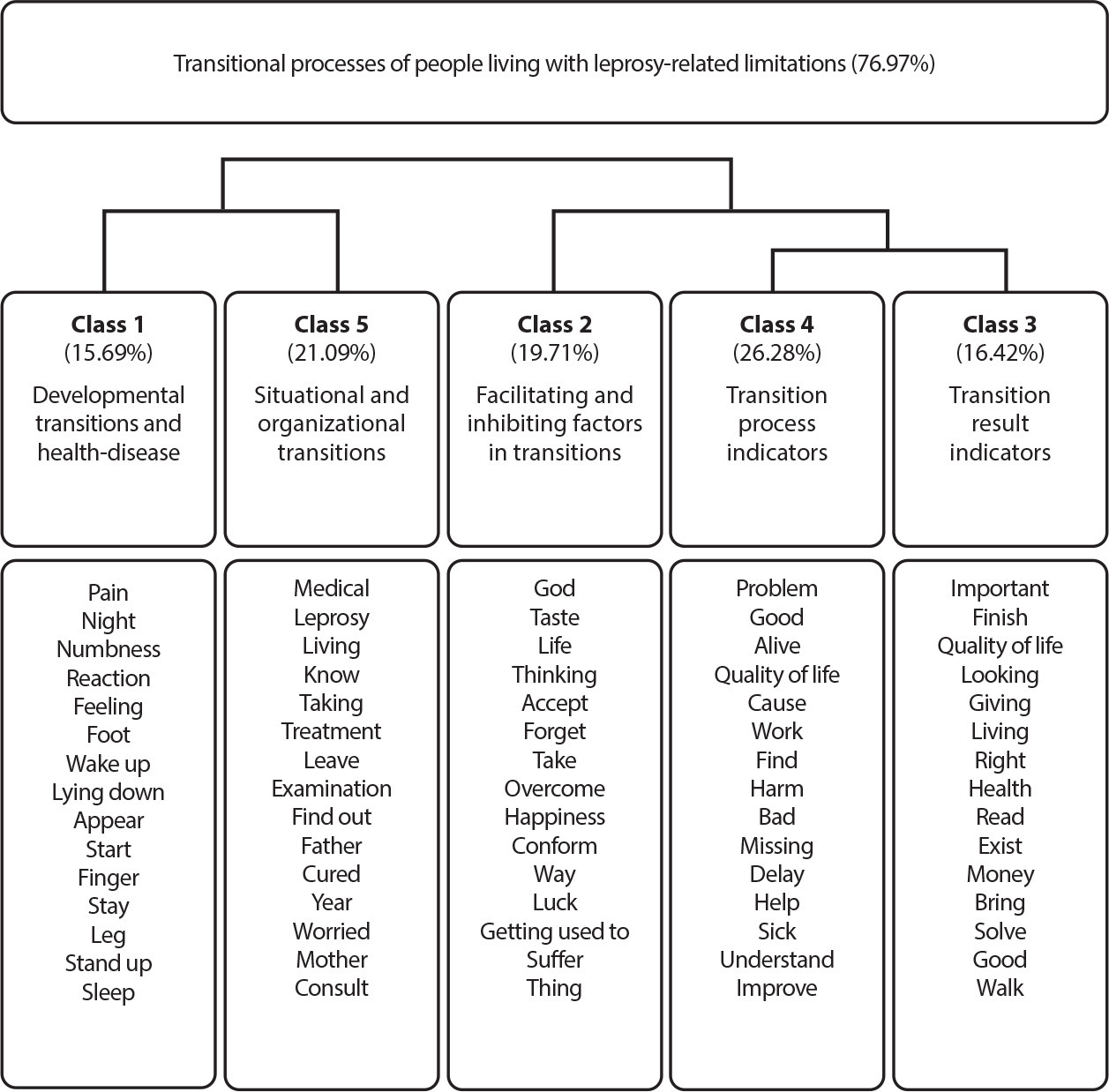
-
11-22-2024
Percepções de pessoas com deficiência física sobre acessibilidade e condições sociais: intervenções para enfermagem de reabilitação
Revista Brasileira de Enfermagem. 2024;77(5):e20240005
Abstract
Percepções de pessoas com deficiência física sobre acessibilidade e condições sociais: intervenções para enfermagem de reabilitação
Revista Brasileira de Enfermagem. 2024;77(5):e20240005
DOI 10.1590/0034-7167-2024-0005
Views0See moreRESUMEN
Objetivos:
analizar las experiencias de personas con discapacidad física adquirida en cuanto a accesibilidad y condiciones sociales; identificar intervenciones de rehabilitación dirigidas por enfermeras para la accesibilidad y condiciones sociales; determinar indicadores sensibles a la enfermería para mejorar la accesibilidad y condiciones sociales.
Métodos:
estudio cualitativo descriptivo-exploratorio utilizó entrevistas semiestructuradas con personas con discapacidad física adquirida mediante muestreo intencionado en bola de nieve para cumplir con todos los objetivos. El análisis de datos siguió los principios del análisis de contenido de Bardin. Los objetivos 2 y 3 se lograron mediante un enfoque teórico reflexivo.
Resultados:
los 27 participantes informaron desafíos de accesibilidad, que impactan las actividades de la vida diaria y las condiciones sociales. Esto influye en la enfermería de rehabilitación, dando lugar a tres campos de intervención: Evaluar la capacidad para realizar actividades diarias y los factores que influyen; Desarrollar e implementar capacitación para la realización de actividades diarias; Promover la movilidad, la accesibilidad y la participación social.
Consideraciones Finales:
a partir de las experiencias de los participantes, identificamos intervenciones de rehabilitación dirigidas por enfermeras para promover la accesibilidad y condiciones sociales.
-
ORIGINAL ARTICLE11-22-2024
Sociodemographic and occupational influences on health professionals’ quality of life
Revista Brasileira de Enfermagem. 2024;77(4):e20240010
Abstract
ORIGINAL ARTICLESociodemographic and occupational influences on health professionals’ quality of life
Revista Brasileira de Enfermagem. 2024;77(4):e20240010
DOI 10.1590/0034-7167-2024-0010
Views0See moreABSTRACT
Objective:
To analyze the sociodemographic and occupational influences on health professionals’ quality of life.
Method:
This descriptive-exploratory, cross-sectional, analytical, and quantitative study addressed 94 health workers, including nursing technicians, nurses, and physical therapists working in Intensive Care Units in a town in the extreme south of Brazil in 2023. The student’s t-test and Spearman correlation were used.
Results:
A significant positive correlation was found between being a woman and the psychological domain and between income and the social and environmental domain while working hours were inversely related to general QoL. Additionally, workload negatively impacted the physical, psychological, and general QOL, furniture negatively influenced the psychological domain, and equipment was negatively associated with the physical and psychological domain.
Conclusion:
The characteristics of the work environment interfere with several areas of quality of life.
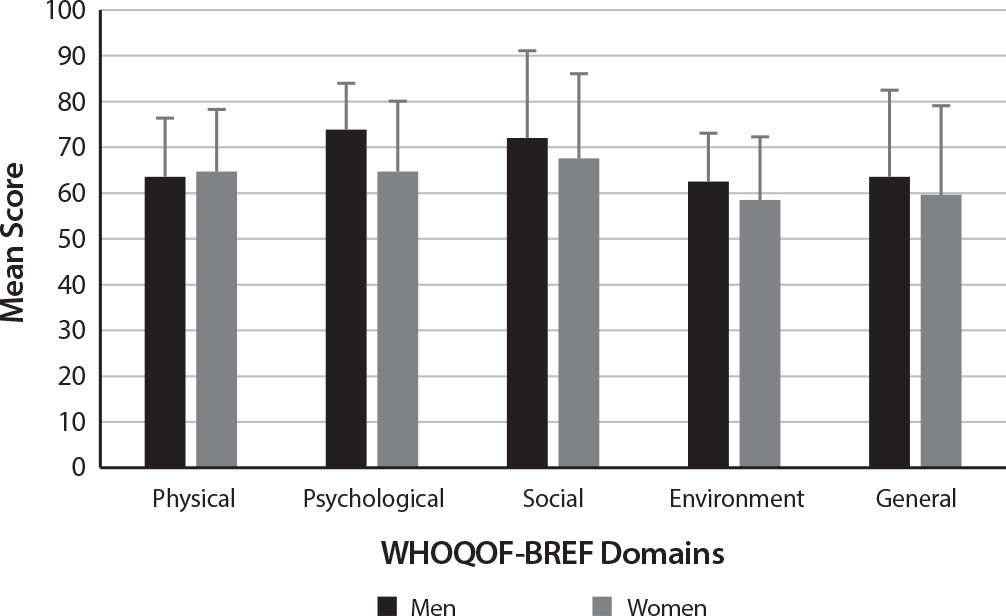
-
REVIEW11-22-2024
Concept analysis of youth: understanding the plurality of subjects
Revista Brasileira de Enfermagem. 2024;77(4):e20240002
Abstract
REVIEWConcept analysis of youth: understanding the plurality of subjects
Revista Brasileira de Enfermagem. 2024;77(4):e20240002
DOI 10.1590/0034-7167-2024-0002
Views0See moreABSTRACT
Objective:
To analyze the concept of “youth.”
Methods:
This is a concept analysis guided by the method proposed by Walker and Avant, operationalized through an integrative literature review. The search in scientific databases was carried out using the descriptors: youth; young; adolescence. To compose the literary corpus, 22 studies were selected.
Results:
Various factors were found in the antecedents that influence the separation of youth groups, contributing to the heterogenization of this population. The attributes include characteristics that comprise the formation of youth groups, especially the idea of shared experiences and social construction, as well as the consequences of the mentioned concept. After systematizing the variables, the analysis was conducted, highlighting the conceptions that influence youth.
Conclusion:
The study demonstrated the multifactorial complexity of the formulation of the concept of youth, highlighting various factors that contribute to this construction. For nursing, this conceptual field allows for an understanding of the population and effective engagement with this group.
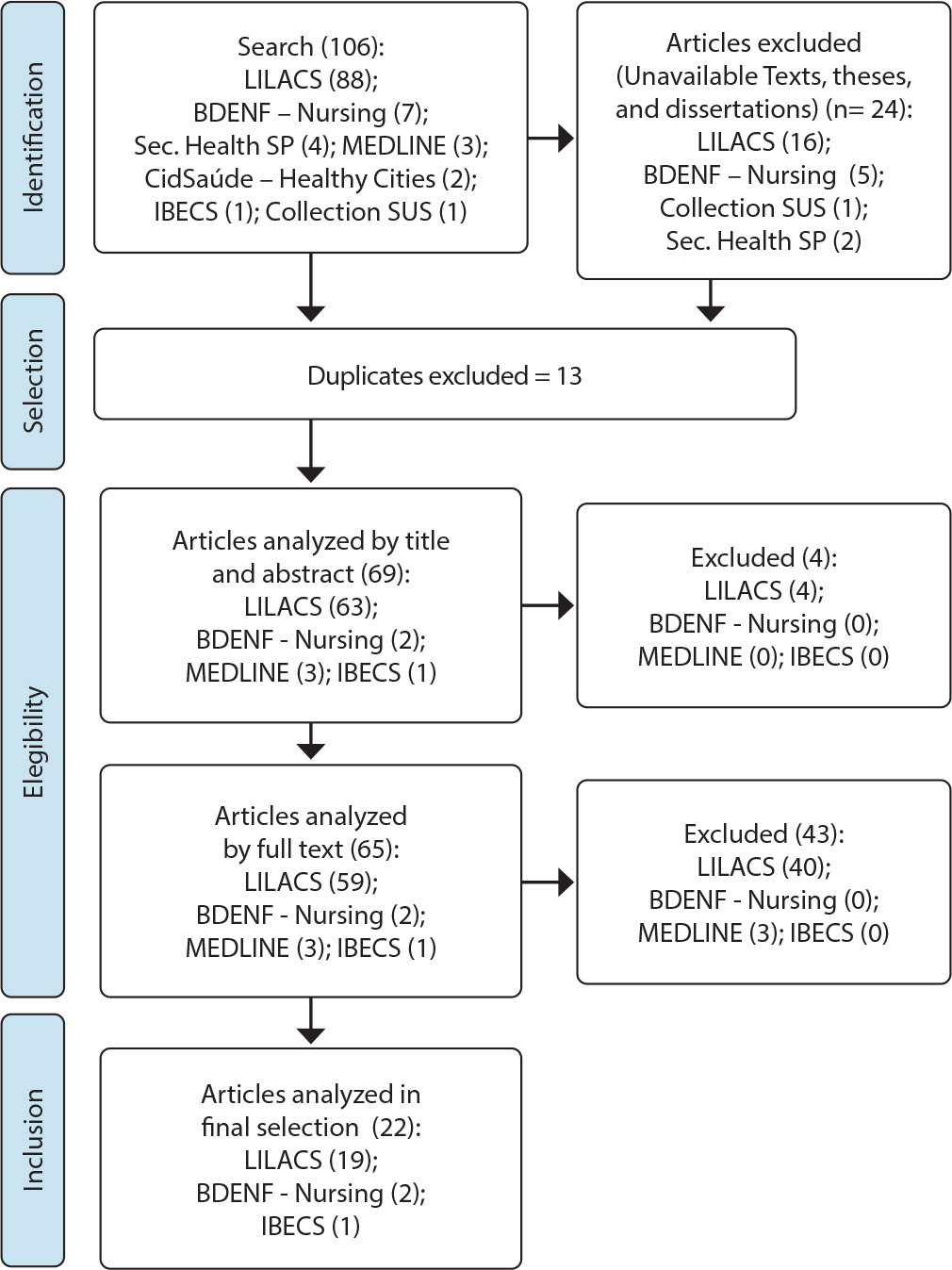
-
ORIGINAL ARTICLE11-22-2024
Temporal trends in neonatal mortality in Pernambuco
Revista Brasileira de Enfermagem. 2024;77(4):e20230451
Abstract
ORIGINAL ARTICLETemporal trends in neonatal mortality in Pernambuco
Revista Brasileira de Enfermagem. 2024;77(4):e20230451
DOI 10.1590/0034-7167-2023-0451
Views0See moreABSTRACT
Objective:
To verify the temporal trend of neonatal mortality in the health regions of Pernambuco between 2000 and 2020.
Method:
A time-series ecological study was conducted, analyzing the total neonatal mortality rate and its early and late components. For regression analysis, Joinpoint Regression was applied, trends were classified, and annual and average percentage changes were calculated for the period, with a significance level of 95%.
Results:
The average neonatal mortality rate in Pernambuco was 11.5 during the studied period. A decreasing trend in neonatal mortality rate was observed, especially in the early component. The region where the state capital is located showed the fastest decrease across all components.
Conclusion:
The temporal trend of neonatal mortality was decreasing; however, the rate of reduction was not uniform across the health regions of the state, and the implementation of the Mãe Coruja Pernambucana Program did not impact the trend in neonatal mortality.
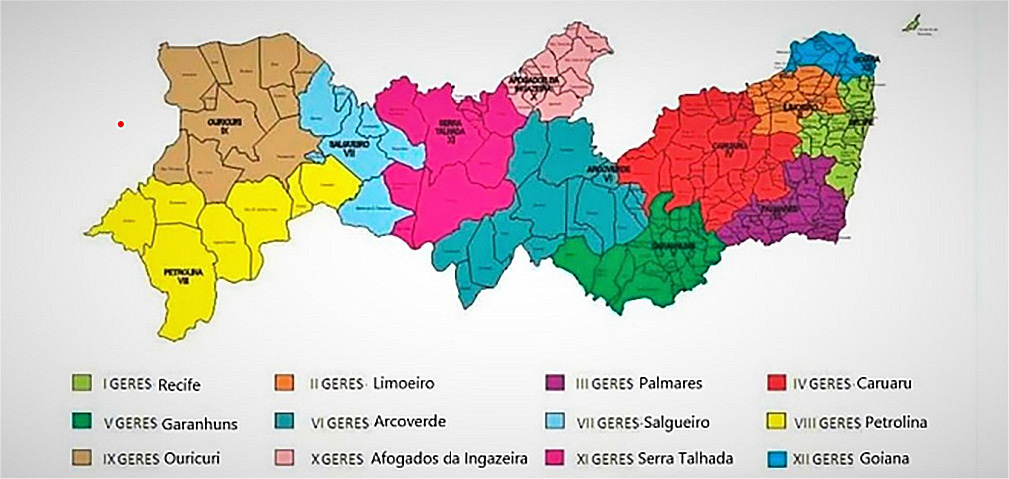
-
ORIGINAL ARTICLE11-22-2024
Evaluation of a video to promote HIV testing in sexual minorities
Revista Brasileira de Enfermagem. 2024;77(4):e20230320
Abstract
ORIGINAL ARTICLEEvaluation of a video to promote HIV testing in sexual minorities
Revista Brasileira de Enfermagem. 2024;77(4):e20230320
DOI 10.1590/0034-7167-2023-0320
Views0See moreABSTRACT
Objective:
To design and evaluate an educational video aimed at promoting HIV testing in gay men from the theoretical perspective of the Nola J. Pender Health Promotion Model.
Methods:
The design comprised five steps: 1.- Literature search; 2.- Formulation of the educational objective; 3.- Drafting of the script and location of the information in the theoretical components; 4.- Production; and 5.- Evaluation by experts and the target population.
Results:
The video “Living Without Fear” was produced, which presents the dilemma faced by gay men before taking a HIV test. The content validity index was 0.85, which indicated that the information was adequate and acceptable for promoting the rapid HIV test.
Final Considerations:
The results contribute to the scientific evidence aimed at promoting healthy behavior. In addition, the video was shown to be an acceptable educational tool.
-
ORIGINAL ARTICLE11-22-2024
Development and validity of a mobile application prototype for hospital shift handover
Revista Brasileira de Enfermagem. 2024;77(4):e20230173
Abstract
ORIGINAL ARTICLEDevelopment and validity of a mobile application prototype for hospital shift handover
Revista Brasileira de Enfermagem. 2024;77(4):e20230173
DOI 10.1590/0034-7167-2023-0173
Views0See moreABSTRACT
Objective:
To develop and validate a mobile application prototype for nursing shift handover in a hospital inpatient unit.
Methods:
A methodological study of technological production, carried out from April 2020 to January 2022, for mobile application construction and validity through the Design Thinking methodology. The study involved the stages of prototype development and validity by experts.
Results:
The application for mobile nursing shift handover obtained a usability score of 79 points and a content validity coefficient of 0.7.
Conclusions:
The instrument obtained an excellent assessment according to usability and agreement among experts. However, future studies are needed to implement this technology in order to assess effectiveness, time optimization and failures during communication.
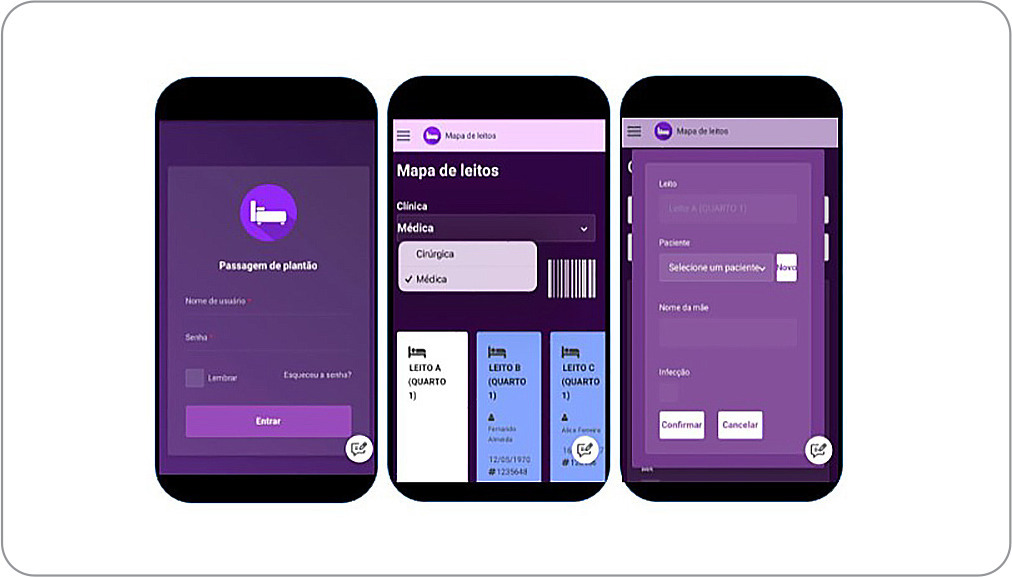
-
ORIGINAL ARTICLE10-25-2024
Analysis of the vaccination situation against Mpox in people living with HIV/AIDS: an ecological study
Revista Brasileira de Enfermagem. 2024;77(5):e20230234
Abstract
ORIGINAL ARTICLEAnalysis of the vaccination situation against Mpox in people living with HIV/AIDS: an ecological study
Revista Brasileira de Enfermagem. 2024;77(5):e20230234
DOI 10.1590/0034-7167-2023-0234
Views0See moreABSTRACT
Objectives:
to analyze the vaccination situation against Mpox in people living with HIV/AIDS in Brazil.
Methods:
an ecological study on the vaccination status against Mpox in people living with HIV/AIDS (PLWHA) in Brazil. The data were collected in April 2023 through information from the Ministry of Health, using the “Microsoft app Power BI,” which is publicly accessible.
Results:
the data analysis revealed that in Brazil, 2,978 doses of the MVA-BN Jynneos Mpox vaccine were administered in PLWHA, resulting in a vaccination coverage of 18.3%, with the southern and southeastern regions showing the lowest and highest vaccination coverage, respectively. Gender-based evaluation showed a higher proportion of vaccinated males.
Conclusions:
we identified low vaccination coverage in all regions of Brazil, highlighting the need for intensified vaccination activities, especially for PLWHA.
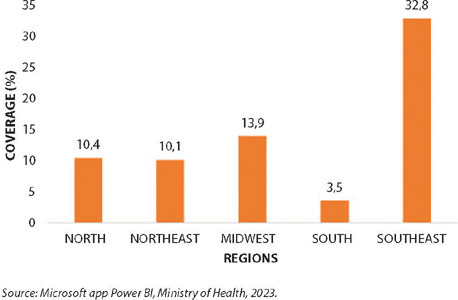
-
ORIGINAL ARTICLE08-08-2022
Social and territorial inequalities in the mortality of children and adolescents due to COVID-19 in Brazil
Revista Brasileira de Enfermagem. 2022;75(6):e20210482
Abstract
ORIGINAL ARTICLESocial and territorial inequalities in the mortality of children and adolescents due to COVID-19 in Brazil
Revista Brasileira de Enfermagem. 2022;75(6):e20210482
DOI 10.1590/0034-7167-2021-0482
Views0See moreABSTRACT
Objective:
To analyze the mortality rate of COVID-19 among children and adolescents aged 0 to 14 years.
Methods:
Ecological and exploratory study of children’s mortality rate by COVID-19 in Brazil, from February to October 2020. The study used the Severe Acute Respiratory Syndrome database to collect the data and made the analysis using descriptive spatial statistics by age and race/color classification.
Result:
The mortality rate due to COVID-19 represented 1.34 deaths per one hundred thousand in the total group evaluated. The age group with the highest frequency and mortality rate was 1 to 4 years of age. There is a higher frequency of deaths in the brown and Indigenous population.
Conclusion:
The distribution of deaths due to COVID-19 is unequal in the national territory, and there is a wide variation in the mortality rate by age and race/color groups.

-
ORIGINAL ARTICLE12-08-2023
Construction and validity of educational technology about the human papillomavirus vaccine for adolescents
Revista Brasileira de Enfermagem. 2023;76:e20230048
Abstract
ORIGINAL ARTICLEConstruction and validity of educational technology about the human papillomavirus vaccine for adolescents
Revista Brasileira de Enfermagem. 2023;76:e20230048
DOI 10.1590/0034-7167-2023-0048
Views1See moreABSTRACT
Objectives:
to construct and validate an educational technology in comic book format about the human papillomavirus vaccine aimed at adolescents.
Methods:
a methodological study, with a quantitative approach, through the agreement method. It was carried out in two phases: educational technology construction and content validity. Participants are expert judges in the health field. Data collection took place in a virtual environment, through a questionnaire. Data analysis was performed by calculating the Content Validity Index. A Content Validity Index of at least 80% was accepted.
Results:
the comic book’s overall Content Validity Index was 82%, reaching the minimum limit established to be validated.
Conclusions:
comics are fundamental in the teaching-learning process, aiming to catch adolescents’ attention. Therefore, it is characterized as a valid tool to inform, in a playful manner, about the human papillomavirus vaccine.

-
ERRATUM02-26-2024
ERRATUM
Revista Brasileira de Enfermagem. 2024;77(1):e20160061
Abstract
ERRATUMERRATUM
Revista Brasileira de Enfermagem. 2024;77(1):e20160061
DOI 10.1590/0034-7167.20247701e03
Views2In the article “Nurses in the labor market: professional insertion, competencies and skills”, with DOI number: , published in Revista Brasileira de Enfermagem, 2017;70(6):1220-6, on page 1225:Include before REFERENCES:[…]See more -
ORIGINAL ARTICLE01-10-2024
Nursing care management strategies to address the COVID-19 pandemic
Revista Brasileira de Enfermagem. 2024;77:e20230254
Abstract
ORIGINAL ARTICLENursing care management strategies to address the COVID-19 pandemic
Revista Brasileira de Enfermagem. 2024;77:e20230254
DOI 10.1590/0034-7167-20230254
Views1See moreABSTRACT
Objective:
To characterize nursing care management strategies for addressing the COVID-19 pandemic.
Method:
A descriptive, qualitative study conducted with 22 nurse professionals at a University Hospital in Southern Brazil. Data collection through interviews in June and August 2021, analyzed according to Bardin’s Content Analysis and the theoretical framework of complex thinking.
Results:
The identified strategies were organized into four categories: Reorganization of health services; People management and emergency admission; Multiprofessional articulation; and Bedside nursing care.
Final Considerations:
Professional performance revealed a complex interplay between leadership and care management practices, even in the face of working condition restrictions, and were understood as crucial in the pandemic scenario.
-
REVIEW01-10-2024
Prevalence and exposure variables of latent infection by mycobacterium tuberculosis in healthcare workers
Revista Brasileira de Enfermagem. 2024;77:e20240052
Abstract
REVIEWPrevalence and exposure variables of latent infection by mycobacterium tuberculosis in healthcare workers
Revista Brasileira de Enfermagem. 2024;77:e20240052
DOI 10.1590/0034-7167-2024-0052
Views1See moreABSTRACT
Objectives:
To identify in the scientific literature the prevalence, diagnostic methods, and exposure variables of latent infection by Mycobacterium tuberculosis in healthcare workers.
Methods:
An integrative review of the scientific literature based on the following review question: What are the available scientific evidence in the literature that address the prevalence of latent infection by Mycobacterium tuberculosis in healthcare workers and its association with possible risk factors among these workers?
Results:
Being a physician or nurse, being older, and being male were generally associated with higher prevalences. The study also showed that interferon-gamma release assays were more commonly used as a diagnostic method compared to skin tests.
Conclusions:
More studies are needed regarding the epidemiology of latent infection by Mycobacterium tuberculosis in the context of healthcare workers, aiming for higher impact actions that contribute to the reduction of tuberculosis worldwide.

-
01-01-2016
Nursing care in Specialized HIV/Aids Outpatient Services
Revista Brasileira de Enfermagem. 2016;69(3):515-521
Abstract
Nursing care in Specialized HIV/Aids Outpatient Services
Revista Brasileira de Enfermagem. 2016;69(3):515-521
DOI 10.1590/0034-7167.2016690314i
Views1See moreABSTRACT
Objective:
to analyze the discourses about the care provided by nurses operating in Specialized HIV/Aids Outpatient Services in four public institutions of the city of Fortaleza, Ceará, Brazil.
Method:
descriptive and exploratory study with a qualitative approach, which used as a method the discourse analysis.
Results:
when titling the “care as negative”, such title came from the analogy proposed by Freud (1912) with the photographic negative, represented by what that care can configure from the unconscious movement, since nurses did not perceive themselves in the care actions developed by supporting the work of other occupational categories, contributing to maintain the ideology of biomedicine.
Conclusion:
it is necessary to justify and theorize a nursing clinical practice from epistemological issues of the profession, in such a way that nurses can understand their relevance within the care provided.
-
ORIGINAL ARTICLE04-16-2021
Practices used by a home care team: implications for caregivers
Revista Brasileira de Enfermagem. 2021;74(2):e20190794
Abstract
ORIGINAL ARTICLEPractices used by a home care team: implications for caregivers
Revista Brasileira de Enfermagem. 2021;74(2):e20190794
DOI 10.1590/0034-7167-2019-0794
Views0See moreABSTRACT
Objectives:
to analyze the practices of a home care team and their implications for caregivers’ performance.
Methods:
qualitative study with data obtained from observation of 21 users, 30 caregivers and 6 professionals from the home health care service in a municipality in Minas Gerais, from February to June 2018. The material was analyzed from the perspective of discourse analysis according to Michel Foucault.
Results:
team interference upon caregivers is exercised by disciplinary practices and prescriptive, authoritative and surveilling behaviors. The team’s knowledge-power relationship determines caregivers’ acceptance through convincing or through difficulty of understanding assigned orientations. Educational practices would enable caregivers to be constituted as active, participative, empowered and reflective subjects.
Final Considerations:
team practices interfere with caregivers’ ways of acting and being and they have implications in objectification and subjectification processes.
-
08-16-2021
Pregnant women’s contribution in the construction and evaluation of an educational technology: the “Comics for Pregnant Women”
Revista Brasileira de Enfermagem. 2021;74:e20201243
Abstract
Pregnant women’s contribution in the construction and evaluation of an educational technology: the “Comics for Pregnant Women”
Revista Brasileira de Enfermagem. 2021;74:e20201243
DOI 10.1590/0034-7167-2020-1243
Views1See moreABSTRACT
Objectives:
to describe the contribution of pregnant women to the construction and evaluation of educational technology.
Methods:
a participatory study developed in three stages, which occurred between March 2018 and June 2019 for identifying the content, construction, and evaluation of the comic. Non-directive interviews were conducted in educational groups with 34 pregnant women. After the comic was built by a team, including a designer, an instrument was applied to 41 pregnant women to evaluate the items Objectives, Organization, Writing style, Appearance, and Motivation.
Results:
the comic contains 40 pages of contents, illustrations, and quizzes (word search, cross-puzzle, seven mistakes, etc). The pregnant women evaluated it as easy to understand, self-explanatory, aesthetically attractive, and capable of motivating good care practices during pregnancy, obtaining a minimum agreement of 92.1%.
Final Considerations:
the innovation of the educational technology consisted of incorporating the voices of pregnant women in prenatal care, with the potential to stimulate reflections and the learning process of this target audience.

Search
Search in:
Nuvem de Tags
Adolescente (85) Atenção Primária à Saúde (239) COVID-19 (91) Criança (91) Cuidados de Enfermagem (269) Educação em Enfermagem (151) Educação em Saúde (139) Enfermagem (930) Enfermagem Pediátrica (86) Estudantes de Enfermagem (77) Estudos de Validação (131) Família (87) Idoso (208) Promoção da Saúde (99) Qualidade de Vida (104) Saúde do Trabalhador (86) Saúde Mental (145) Saúde Pública (82) Segurança do Paciente (150) Tecnologia Educacional (100)



